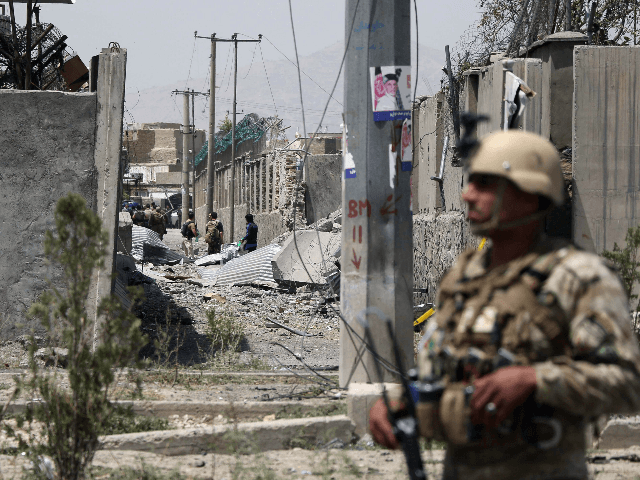The United States Special Inspector General for Afghanistan Reconstruction (SIGAR), an agency that monitors U.S. spending in the country, found over $2 billion in wasted taxpayers’ dollars in its latest review, the Afghan news agency Khaama Press reported Monday.
SIGAR regularly traces the use of American funding in the country, monitoring facilities and other assets built with American money and judging the projects based on their usefulness to the area in which they were built. SIGAR reports regularly find extensive financial waste in the country, including American expenditures on unusable buildings, entertainment venues, or misuse of funds that have ended up helping opium cultivation.
The United States invaded Afghanistan in the aftermath of the September 11, 2001, terrorist attacks, overthrowing the jihadist Taliban regime in response to its harboring of al-Qaeda terrorists. President Joe Biden’s administration announced Monday it would continue the peace talks his predecessor, Donald Trump, began with both the legitimate Afghan government in Kabul and the Taliban, though multiple government officials have hinted Biden may not respect the Trump administration’s promise to withdraw all American troops by May.
The latest report, completed February 24 but surfacing in Afghan media Monday, studied about $7.8 billion in American money spent in Afghanistan.
“Of the nearly $7.8 billion in capital assets reviewed in its prior reports, SIGAR identified about $2.4 billion in assets that were unused or abandoned, had not been used for their intended purposes, had deteriorated, or were destroyed,” the report read. “By contrast, SIGAR found that more than $1.2 billion out of the $7.8 billion in assets were being used as intended, and only $343.2 million out of the $7.8 billion in assets were maintained in good condition.”
The assets discussed in the study were largely buildings constructed at the American taxpayers’ expense. SIGAR monitored 60 “assets” and found many were impossible to use because authorities responsible had not invested in upkeep, resulting in “broken or leaky pipes, damaged bathroom fixtures, or blocked drains;” dangerous water damage, structural damage to roofs, walls, or floors; and broken electrical wiring. Some of the assets reviewed showed signs of some repair in the form of “improvised wiring for broken electrical fixtures” that elevated the risk of a fire.
Despite the waste, most of the 60 assets evaluated were being used properly and maintained appropriately.
“To help ensure that U.S.-funded capital assets in Afghanistan are used as intended and maintained, Congress may wish to consider requiring U.S. agencies to develop, implement, and periodically update sustainment plans,” the SIGAR report suggested, “in coordination with the beneficiaries of future capital assistance projects.”
The report noted that SIGAR began its work in 2008 and that Congress has, between then and now, appropriated “$109.24 billion for humanitarian, security, and reconstruction assistance in Afghanistan.” Prior SIGAR reports have unveiled the use of American taxpayer funding on projects such as a soccer stadium that was not built to standard measurements — and thus could not host games; staircases built going nowhere in one-floor buildings; and “counter-narcotics” programs that had no discernible effect. In 2018, a SIGAR report revealed that “agricultural” projects built with American money in Afghanistan were benefitting opium and heroin production.
An agreement between the Trump administration and the Taliban on negotiating a U.S. exit from Afghanistan, presumably with an end to heavy investments like those SIGAR monitors, turned one year old on Sunday. Afghan officials used the opportunity to accuse the Taliban of breaking the deal and urge American officials not to withdraw.
Afghanistan’s Tolo News compiled some of the pessimism out of Kabul on Sunday.
“They (Taliban) have committed to cut their ties with terrorist groups; however, according to information obtained by the government, they have not cut these ties,” State Minister for Peace Affairs Sayed Saadat Mansoor Naderi said.
“There isn’t anything in this agreement to give hope to Afghans. This has made progress in the peace process fragile,” said Rahmatullah Andar, spokesman for the National Security Council.
“Afghans expected that violence would end when the deal was signed, but this did not happen and instead it increased,” President Ghani’s special envoy for Pakistan, Mohammad Umer Daudzai, said.
The deal, later elaborated upon in meetings between Taliban leaders and American diplomats in September, would require the Taliban to no longer harbor foreign terrorist organizations like al-Qaeda and to not attack American troops. In exchange, Washington would withdraw from Afghanistan by May 1.
The Taliban insisted in an official statement Sunday that it had kept its commitments, despite many doubters.
“The Taliban said that they have fulfilled their commitments to the agreement, blaming ‘the other side’ for violating the agreement and said the US has continued to bombings and operations,” according to Tolo News, which translated the statement. “The Taliban said any attempt to seek an alternative for the agreement will end to failure in peace efforts.”
Secretary of Defense Lloyd Austin hinted in remarks to NATO last month that the Biden administration may not keep to the May 1 deadline. According to a readout of Austin’s comments to other NATO ministers, he “reassured Allies that the U.S. would not undertake a hasty or disorderly withdrawal from Afghanistan.”
“We are still involved in trying to get a negotiated settlement. The Taliban have not met their commitments,” Pentagon spokesman John Kirby said shortly before Austin’s remarks. “As you know, there is a looming deadline of early May … but without them meeting our commitments to renounce terrorism and to stop the violent attacks on the Afghan National security forces and by dint of that the Afghan people, it’s very hard to see a specific way forward for the negotiated settlement.”

COMMENTS
Please let us know if you're having issues with commenting.